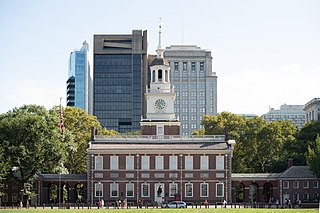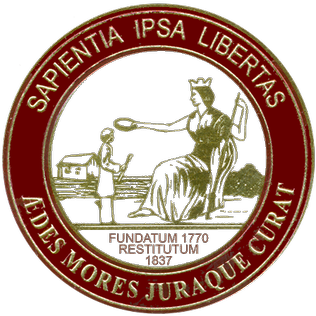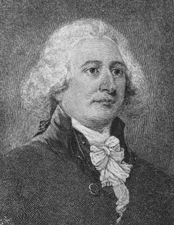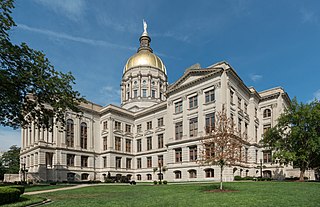
Frankfort is the capital city of the Commonwealth of Kentucky, United States, and the seat of Franklin County. It is a home rule-class city; the population was 28,602 at the 2020 census. Located along the Kentucky River, Frankfort is the principal city of the Frankfort, Kentucky Micropolitan Statistical Area, which includes all of Franklin and Anderson counties.

Independence Hall is a historic civic building in Philadelphia, where both the United States Declaration of Independence and the United States Constitution were debated and adopted by America's Founding Fathers. The structure forms the centerpiece of the Independence National Historical Park and has been designated a UNESCO World Heritage Site.

The College of Charleston is a public university in Charleston, South Carolina. Founded in 1770 and chartered in 1785, it is the oldest university in South Carolina, the 13th oldest institution of higher learning in the United States, and the oldest municipal college in the country. The founders of the institution include three future signers of the Declaration of Independence, and three future signers of the United States Constitution.

John Brown was an American lawyer and statesman who participated in the development and formation of the State of Kentucky after the American Revolutionary War.

Faneuil Hall is a marketplace and meeting hall located near the waterfront and today's Government Center, in Boston, Massachusetts. Opened in 1742, it was the site of several speeches by Samuel Adams, James Otis, and others encouraging independence from Great Britain. It is now part of Boston National Historical Park and a well-known stop on the Freedom Trail. It is sometimes referred to as "the Cradle of Liberty", though the building and location have ties to slavery.

The Georgia State Capitol is an architecturally and historically significant building in Atlanta, Georgia, United States. The building has been named a National Historic Landmark which is listed on the National Register of Historic Places. As the primary office building of Georgia's government, the capitol houses the offices of the governor, lieutenant governor, and secretary of state on the second floor, chambers in which the General Assembly, consisting of the Georgia State Senate and Georgia House of Representatives, meets annually from January to April. The fourth floor houses visitors' galleries overlooking the legislative chambers and a museum located near the rotunda in which a statue of Miss Freedom caps the dome.

The Kentucky State Capitol is located in Frankfort and is the house of the three branches of the state government of the Commonwealth of Kentucky. The building is listed on the National Register of Historic Places.

Monterey State Historic Park is a historic state park in Monterey, California. It includes part or all of the Monterey Old Town Historic District, a historic district that includes 17 contributing buildings and was declared a National Historic Landmark in 1970. The grounds include California's first theatre, and the Monterey Custom House, where the American flag was first raised over California.

The National Society of The Colonial Dames of America is an American organization composed of women who are descended from an ancestor "who came to reside in an American Colony before 1776, and whose services were rendered during the Colonial Period." The organization has 44 corporate societies and over 15,000 members. The national headquarters is Dumbarton House in Georgetown, Washington, D.C. The executive director since September 2021 is Carol Cadou.

The Corydon Historic District is a national historic district located in Corydon, Indiana, United States. The town of Corydon is also known as Indiana's First State Capital and as Historic Corydon. The district was added to the National Register of Historic Places in 1973, but the listing was amended in 1988 to expand the district's geographical boundaries and include additional sites. The district includes numerous historical structures, most notably the Old Capitol, the Old Treasury Building, Governor Hendricks' Headquarters, the Constitution Elm Memorial, the Posey House, the Kintner-McGrain House, and The Kintner House Inn, as well as other residential and commercial sites.

The Frankfort Cemetery is a historic rural cemetery located on East Main Street in Frankfort, Kentucky. The cemetery is the burial site of Daniel Boone and contains the graves of other famous Americans including seventeen Kentucky governors and a Vice President of the United States.

Schuyler Mansion is a historic house at 32 Catherine Street in Albany, New York. The brick mansion is now a museum and an official National Historic Landmark. It was constructed from 1761 to 1765 for Philip Schuyler, later a general in the Continental Army and early U.S. Senator, who resided there from 1763 until his death in 1804. It was declared a National Historic Landmark on December 24, 1967. It is also a contributing property to the South End–Groesbeckville Historic District, listed on the National Register of Historic Places in 1984.

The Liberty Hall Museum, located in Union, Union County, New Jersey, United States, is a historic home where many leading influential people lived. It is now a museum. Originally a fourteen-room Georgian-style house, it was built in 1772. Liberty Hall stands today as a fifty-room Victorian Italianate mansion. Liberty Hall has been home to many historical figures and was the home of William Livingston, the first Governor of New Jersey, who served from 1776 to 1790; United States Supreme Court Justice Henry Brockholst Livingston; the Kean political dynasty, including Susan Livingston Kean, widow of Continental Congress delegate John Kean, United States Senator and Congressman John Kean, and Captain John Kean, son of United States Senator Hamilton Fish Kean; and, in its first year of occupancy, future Treasury Secretary Alexander Hamilton. Liberty Hall has had visitors of such stature as George Washington, Martha Washington, Lewis Morris, Marquis de Lafayette, Elias Boudinot, and John Jay, the latter of whom was married there.

Mount Clare, also known as Mount Clare Mansion and generally known today as the Mount Clare Museum House, is the oldest Colonial-era structure in the City of Baltimore, Maryland, U.S.A. The Georgian style of architecture plantation house exhibits a somewhat altered five-part plan. It was built on a Carroll family plantation beginning in 1763 by barrister Charles Carroll the Barrister, (1723–1783), a descendant of the last Gaelic Lords of Éile in Ireland and a distant relative of the much better-known Charles Carroll of Carrollton, (1737–1832), longest living signer of the Declaration of Independence and the richest man in America in his later years, also the layer of the First Stone of the new Baltimore and Ohio Railroad, just a short distance away in 1828.

Corner in Celebrities Historic District is a neighborhood located in the north section of Frankfort, Kentucky that is designated an historic district because of the high concentration of structures that previously belonged to notable residents. The area contains the historic homes of George M. Bibb, Benjamin G. Brown, James Brown, John Brown, John J. Crittenden, Thomas Crittenden, James Harlan, John Marshall Harlan, Robert P. Letcher, William Lindsay, Thomas Metcalfe, Charles Slaughter Morehead, William Owsley, Hugh Rodman, Charles S. Todd, Thomas Todd, George G. Vest, John C. Watson, and Simeon Willis. The area was added to the U.S. National Register of Historic Places in 1971.


















